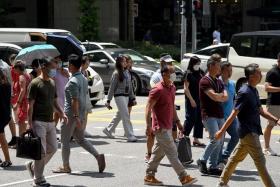Hiring the right pre-school teacher
Expect more places for children and professionalising of the pre-school sector - early childhood was one of three spotlights of Prime Minister Lee Hsien Loong's annual address this year.
On spaces, an additional 40,000 new places will be created in the next five years, raising the total number of pre-school places to about 200,000, among other things, said PM Lee in his National Day Rally speech on Aug 20.
On professionalism, the Prime Minister announced the formation of the National Institute of Early Childhood and Development.
The new institute will bring existing pre-school teacher training programmes in Temasek and Ngee Ann polytechnics, ITE and the Seed Institute under one roof.
Salaries of pre-school professionals will also be improved, said PM Lee, who also focused on diabetes and Smart Nation initiatives in his speech.
Yet attracting the right people to the profession is another matter: How do you judge the traits that would make someone a great pre-school teacher?
Zebras don’t change their stripes — neither do candidates.
How do companies vet for the right person for the job? Hiring the wrong person could mean a costly error, particularly for senior roles.
Take some of the risks out of your company's talent evaluation process via these principles.
PAST INDICATORS
The best predictor of future behaviour is past patterns. Look for themes that characterise how the person operated in prior roles.
Zebras don't change their stripes - neither do candidates. No organisation wants its success to depend on an individual's ability - or inability - to change his ways.
FACE VALUE
What you see is what you get: do not make excuses for a candidate. Never apologise for a person's behaviour or how he comes across in the selection process.
For instance, a candidate who is cold or nasty to your administrative staff is likely to operate that way with other people in your organisation.
CULTURAL FIT
Organisational cultures vary. So do individuals' values and attitudes towards status, social mores, financial drivers and decision-making. A poor fit is either going to be unhappy or work to change the organisation's culture to fit his values and preferences.
For instance, someone used to making decisions based largely on intuition will find it tough in an organisation that values analysis of data and logical decision-making processes.
Hiring the right employee is critical for organisational success. Assess rigorously: evaluate an individual's capabilities revealed in past performance, pay attention to behaviours and consider the cultural fit.
If doubts arise, keep looking.
This article was contributed by Right Management (www.rightmanagement.sg), the global career experts within United States-listed HR consulting firm, ManpowerGroup.
Get The New Paper on your phone with the free TNP app. Download from the Apple App Store or Google Play Store now



